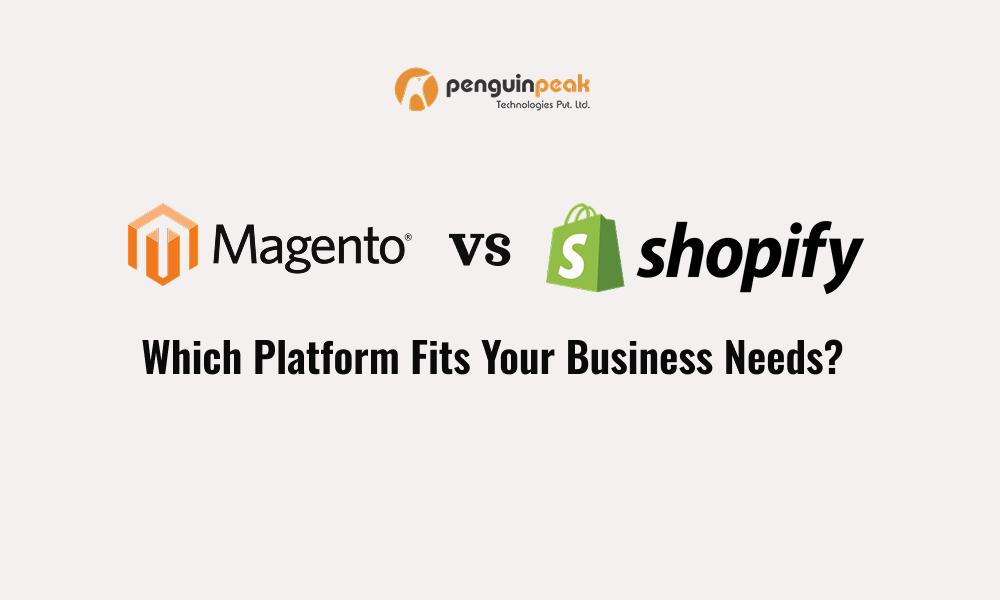Magento vs Shopify: Which Platform Fits Your Business Needs?

Choosing the right eCommerce platform is one of the most important decisions for any business entering the digital marketplace. Whether you’re building your first online store or scaling an existing one, the platform you choose directly affects your growth, flexibility, and overall customer experience.
Two of the most popular platforms leading this space are Shopify and Magento. Both are powerful tools used by thousands of online businesses worldwide but they serve different purposes and audiences.
In this guide, we’ll explore the strengths and weaknesses of each, helping you decide which one fits your business needs best. We’ll also look at how working with a Shopify development company USA or a Magento development service can make a big difference in how your online store performs.
1. Understanding Shopify and Magento
Let’s start with a quick overview of both platforms.
Shopify is a cloud-based, hosted eCommerce platform that provides an all-in-one solution for setting up and running an online store. It takes care of hosting, security, and maintenance, allowing you to focus on selling products. Its user-friendly interface and ready-to-use themes make it a favorite among startups and small businesses.
In contrast, Magento (now known asAdobe Commerce) is an open-source platform that offers complete control and flexibility. It’s ideal for medium to large businesses that require custom features, advanced integrations, and scalability. Since it’s open-source, Magento allows developers to modify every aspect of the code, making it an extremely versatile solution for complex eCommerce needs.
2. Ease of Use
When it comes to ease of use, Shopify clearly has an edge. Its intuitive dashboard and dragand-drop functionality make it simple for anyone to build and manage a store even without technical knowledge.You can get your online shop up and running within hours, and if you partner with a professional Shopify development company USA, you can further optimize it for better performance, design, and conversions.
Magento, on the other hand, is more complex. It’s built for developers and requires technical expertise to install, configure, and maintain. Without the support of a Magento development service, most businesses find it difficult to handle server management, security patches, and customizations.
If simplicity and speed are your top priorities, Shopify is the clear winner. But if you want full control and don’t mind investing in development, Magento is worth considering.

Watch VideoAt: https://youtu be/hhPcGQm5L6U
3. Customization and Flexibility
Customization is where Magento truly shines. Because it’s open-source, you can customize everything from product catalogs and checkout processes to backend integrations and user experience.Askilled Magento development service can create a completely tailored online store that matches your business’s specific needs and branding.
Shopify, while customizable to an extent, has certain limitations. You can use themes, apps, and custom code (to a degree), but you won’t have full control over the backend. Shopify’s closed system means some advanced features or unique workflows might not be achievable without workarounds.
In short, Shopify is great for quick customization through themes and apps, but Magento wins in deep flexibility and full control.
4. Cost and Budget Considerations
Cost is another major factor in the Shopify vs Magento debate.
Shopify offers predictable, tier-based pricing. Its plans start at around $39 per month and go up depending on the features and scale of your store. You’ll also need to budget for premium themes, apps, and potential transaction fees (unless you use Shopify Payments). Hiring a Shopify development company USAcan help you make the most of your budget by optimizing your setup for performance and conversions.
Magento works differently The open-source version is free to download, but you must pay for hosting, themes, extensions, and developer support. If you chooseAdobe Commerce (Magento Enterprise), costs increase significantly but include hosting and more advanced business tools.AMagento development service can help you manage these costs effectively by ensuring your setup is efficient and scalable.
To summarize this section: Shopify is ideal for small to mid-sized businesses with fixed budgets, while Magento suits enterprises that can invest in advanced customization and maintenance.
5. Scalability and Growth Potential
Both Shopify and Magento are highly scalable, but they handle growth differently.
With Shopify, scalability is seamless.As your business grows, you can easily upgrade your plan or move to Shopify Plus, designed for high-volume enterprises. You don’t have to worry about server capacity, updates, or security; everything is managed for you.
Magento, however, offers complete scalability on your terms. You can manage multiple stores, handle massive product catalogs, and implement advanced integrations without restrictions. But this scalability requires technical expertise and robust hosting infrastructure, typically managed by an experienced Magento development service.
If you want hands-free scaling, Shopify is more convenient. If you want to control every aspect of your growth, Magento is the better fit.
Contact UsToday
